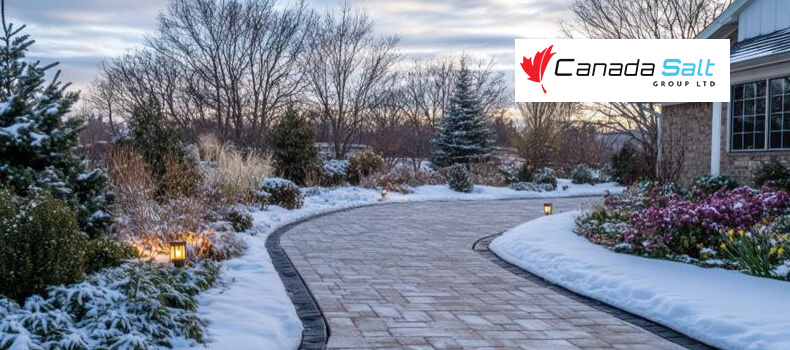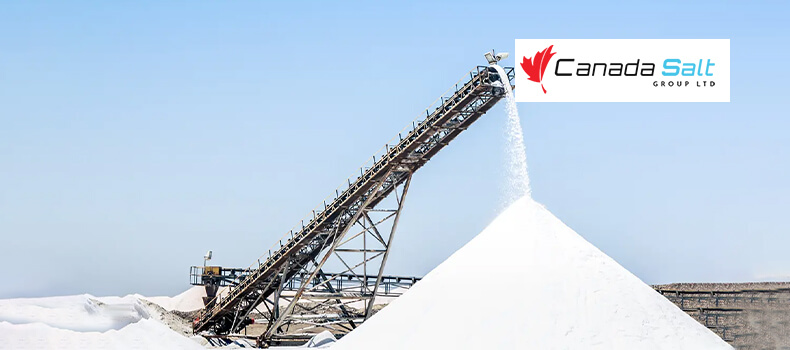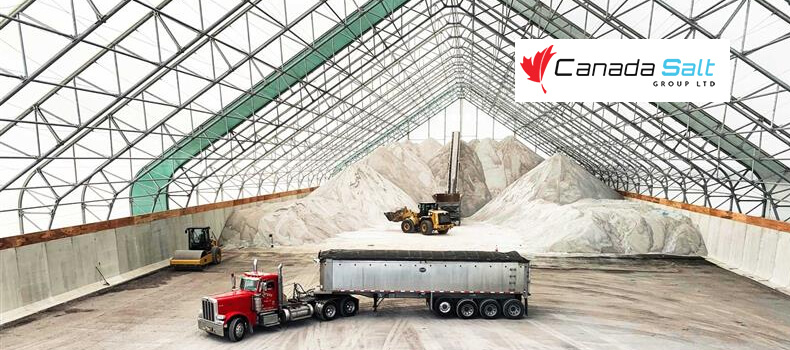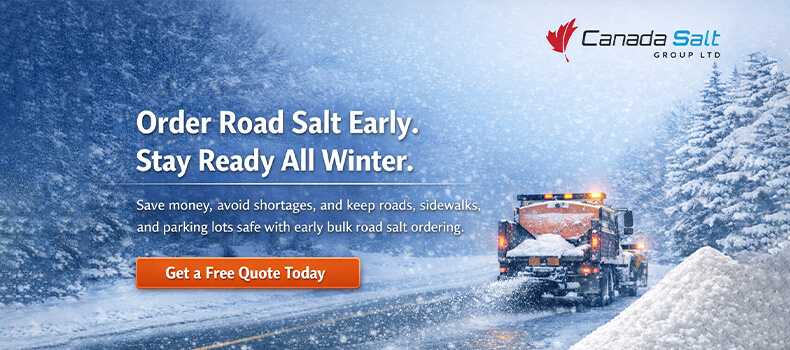Winter Landscaping Tips: How Bulk Salt Protects Driveways and Walkways?
Winters are beautiful and scenic, but also stressful, especially when maintaining your outdoor space. So, with the right tools and materials, like bulk salt, you can maintain your driveways and walkways safe, non-slippery, and ice-free surfaces throughout the winter. During this time, bulk salt plays a major role in removing dangerous ice spots and makes snow removal easier. In this article, we will explain how bulk salt protects driveways and walkways.
Why Winter Maintenance Matters
When snow or ice covers surfaces, even simple routine tasks like walking or carrying groceries from the store become challenging. Slippery driveways and walkways are the most common cause of injuries, leading to falls, slips, and even broken bones. Winter landscaping is much more than aesthetics. It’s about maintaining safety and preventing accidents. With proper care, your home will be accessible, functional and safe from winter damage.
How Ice and Snow Damage Walkways and Driveways
When it’s snowing, ice not only spreads on the surface but also seeps into the tiny cracks and pores in your pavement. So, when the temperature is low, the trapped water will freeze, widening the cracks. Slowly, during the freeze-thaw cycle, can damage concrete, asphalt, and pavers, leading to potholes, uneven surfaces, and expensive repairs. So, maintaining your driveway or walkway is important to prevent damage much faster than it would normally.
Understanding Bulk Salt
What Exactly Is Bulk Salt?
Simply put, bulk salt is deicing salt purchased in large quantities. Apart from buying salt in small bags, it’s better to opt for bulk salt by the ton, which is perfect for winter use. Usually, homeowners with long driveways, snow removal contractors, construction companies, and municipalities rely on bulk salt for snow and ice management.
Types of Bulk Salt Used for Winter Maintenance
Rock Salt (Sodium Chloride)
Rock salt is a commonly used deicer that most people choose. It is an affordable, commonly available ice-melting commodity. Rock salt is effective at normal temperatures, usually down to –7°C (20°F), which is enough for most snowy regions.
Treated & Enhanced Salts
Treated salts are the enhanced versions of rock salt. Here, rock salt is blended with other agents, such as magnesium chloride, calcium chloride, or salt brine, to improve its efficiency even in extreme winter conditions. Treated salts adhere better to surfaces, reducing scatter and improving efficiency.
Eco-Friendly Salt Blends
Homeowners who are more environmentally conscious often choose eco-friendly salt blends. They are less harmful to plants, animals, and the soil nearby than other deicers, and they also reduce corrosion. These deicers are known for their effective ice control while being gentle on the environment.
How Bulk Salt Protects Driveways and Walkways
Melting Ice at Low Temperatures
When salt is spread on an icy surface, it lowers the freezing point of water through a phenomenon called freezing-point depression. Salt breaks the bond between the surface and the ice, making it easier to remove snow. This overall process will also be carried out at temperatures below freezing, ensuring clear driveways and walkways.
Preventing Ice Formation Before It Starts
Applying salt to a driveway or walkway before it snows creates a protective layer that prevents snow or ice from adhering to the surface. As you start lowering the snow, you will notice it comes off easily, leaving no ice patches. This whole process is called pre-salting, which is one of the smartest ways to remove ice, saving time, labour, and salt.
Boosting Traction for Safety
The salt adds traction before it starts working on the surface. This traction reduces the slips and skids on walkways, driveways and steps. Whether you are going out to warm up your car or waiting for your parcel to be delivered, this added grip will keep everyone safe.
Benefits of Using Bulk Salt for Landscaping
Cost-Effective for Large Areas
Bulk salt buying reduces the price per pound compared to bagged salt from retail stores. So, if you have a long driveway, many walkways, or need frequent winter applications, bulk salt is your go-to option to save money and avoid running out in emergencies.
Fast and Easy Application
You don’t need any special equipment to spread bulk salt. You can do it with a scoop, or use a push spreader. If the area is larger, you can use a vehicle mounted with a spreader. Once applied, the salt starts working immediately, helping to quickly and effectively manage ice surfaces.
Long-term Protection Against Damage
Snow and ice are the main reasons for cracks, surface erosion, and infrastructure damage. So, if there are fewer freeze-thaw cycles, you can save your hard surfaces intact. This helps to extend the life of pavement and prevents expensive repairs.
How to Use Bulk Salt Correctly
When to Apply Salt
Salt works efficiently when applied wisely:
- Before Snowfall: It prevents ice from adhering to the surface, making snow removal much easier.
- After Snowfall: If any icy patches remain after snow removal, they will be removed when salt is spread.
- During the Snowfall: As salt starts working immediately when spread during snowfall, it improves traction and prevents ice buildup.
Timing plays a key role in ice management. When you apply too late, it may require more effort and materials.
How Much Salt Should Be Used?
Most of us assume that using more salt improves the efficiency of the ice melting. But in reality, spreading a thin layer of salt is effective. Too much salting can lead to environmental concerns and damage to concrete, plants, and soil. So, use the salt wisely for effective snow and ice management.
Common Mistakes to Avoid
- Over-salting
- Applying salt to warm and dry surfaces
- Not clearing snow first
- Using salt on fresh concrete
Best Places to Use Bulk Salt on Your Property
Driveways
The driveway is one of the most used and important surfaces of your home. So, please pay attention to it when winter hits. Using salt prevents the vehicles from sliding by providing them enough traction and keeps your car accessible throughout the winter.
Walkways and Sidewalks
These areas experience the most foot traffic and need to be maintained for safety. Salting reduces slips and falls among people accessing the walkways and moving sideways.
Steps, Porches, and Entrances
These busy areas can become slippery during winter. Regularly spreading salt will ensure that people who come or go from your home stay safe, even during extreme icy conditions.
Hard Surfaces near Landscaped areas
It is important to remember that salt will seep into grassy areas or garden beds. So, spread the salt carefully. It’s better to use less salt to prevent damage to plants and nearby soil, or opt for eco-friendly blends.
Choosing the Right Bulk Salt for Your Needs
Climate and Temperature Considerations
Various types of salt work effectively at different temperatures. If you are living in extremely cold regions, it’s better to opt for blended or magnesium-based salts. Choose the salt that works in the lowest temperature range in your region.
Surface Material Compatibility
Rock salt can be used on asphalt roads. But if you are using it on concrete, it can corrode the surface, especially on fresh concrete. If the surface is delicate, consider using treated or eco-friendly salts.
Environmental Concerns
If you have pets, a garden, a grassy area, or landscaping, it’s better to reduce salt use, as it can seep into these areas and cause concerns.
Tips for Winter Landscaping Beyond Salt
Snow Removal Tools and Techniques
Salt works best when there is a proper snow removal process. A good shovel, snow pusher, or blower can clear the surface, ensuring it is clear and functional. By removing snow promptly, you can prevent risks associated with the ice patches.
Safety Tips for the Winter Season
Choose footwear with a better grip, particularly while walking on salted areas. So, it’s better to clear the snow before it becomes hard and spread salt whenever you see ice starting to form.
Protecting Plants and Lawns in Winter
Winter brings challenges to vegetation. Cover sensitive plants with burlap, add mulch to garden tools, and use barriers to prevent salt from runoff. These simple steps can help you protect your landscaping from runoff.
Conclusion
Bulk salt is one of the most important commodities for winter ice management. It prevents ice buildup on surfaces and provides long-term protection. So, using the right type of salt and better application methods, you can be stress-free throughout the winter. If you are looking for a reliable bulk salt supplier, we are here for you! At Canada Salt Group Ltd, we supply high-quality bulk road salt and salt products to meet your requirements. Contact us today for a free quote!





